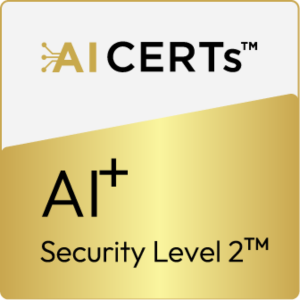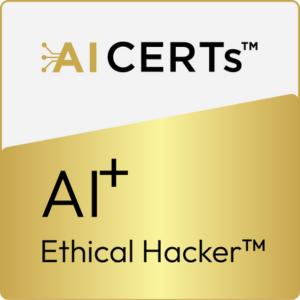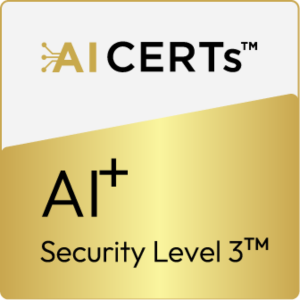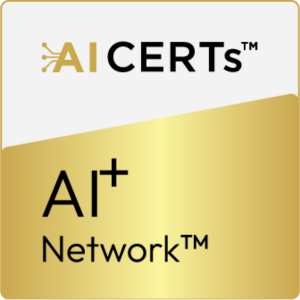Prerequisites
- Completion of AI+ Security Level 1™ (recommended but not mandatory).
- Familiarity with Python programming basics (variables, loops, and functions).
- Understanding of the CIA triad, common cybersecurity principles, and threats like malware.
- Awareness of basic machine learning concepts (technical skills not required).
- Proficiency in networking fundamentals (IP addressing, TCP/IP protocols).
- Basic Linux/command line skills for navigating tools and environments.
- Interest in applying AI for real-time cybersecurity solutions.
- There are no mandatory prerequisites for certification. Certification is based solely on performance in the examination. However, candidates may choose to prepare through self-study or optional training offered by AI CERTS Authorized Training Partners (ATPs).
Exam Details
- Modules (10)
- Examination (1)
- 50 MCQs, 90 Minutes
- Passing Score (70% (35/50) )
Exam Blueprint
| Modules | Percentage |
|---|---|
| Introduction to Artificial Intelligence (AI) and Cyber Security | 8 |
| Python Programming for AI and Cyber Security Professionals | 10 |
| Application of Machine Learning in Cyber Security | 10 |
| Detection of Email Threats with Artificial Intelligence (AI) | 11 |
| Artificial Intelligence (AI) Algorithm for Malware Threat Detection | 11 |
| Network Anomaly Detection using Artificial Intelligence (AI) Techniques | 11 |
| User Authentication Security with Artificial Intelligence (AI) | 11 |
| Generative Adversarial Network (GAN) for Cyber Security | 11 |
| Penetration Testing with Artificial Intelligence | 11 |
| Capstone Project | 6 |
What you will get
High-Quality Videos, E-book (PDF & Audio), and Podcasts
AI Mentor for Personalized Guidance
Quizzes, Assessments, and Course Resources
Online Proctored Exam with One Free Retake
Comprehensive Exam Study Guide
Why This Certification Matters
Master AI-Cybersecurity Fusion
Learn how artificial intelligence enhances cybersecurity across threat detection, defense, and predictive analytics.Hands-On Python for Security
Build practical coding expertise in Python, tailored for AI-based cybersecurity tools and applications.AI-Powered Threat Detection
Gain skills in machine learning to detect and counter threats like malware, phishing, and anomalous behavior in networks.Explore Advanced AI Frameworks
Work with cutting-edge models like GANs and AI-driven authentication to fortify digital systems against sophisticated attacks.Capstone-Ready, Job-Ready
Apply everything you’ve learned in a real-world Capstone Project designed to simulate advanced security engineering challenges.
Ideal Candidates for AI+ Security Level 2™ Certification
Cybersecurity Professionals
Those already working in cybersecurity who want to deepen their skills with AI-driven tools, threat detection, and proactive defense strategies.AI Enthusiasts with a Security Focus
Learners who have a basic understanding of cybersecurity and Python, and are keen to explore how AI can enhance security operations.Junior Security Engineers / Analysts
Professionals with foundational skills in cyber operations who want to grow into AI-enhanced cybersecurity roles.IT and Network Administrators
Admins who handle daily network operations and wish to integrate AI for real-time threat detection and anomaly monitoring.Graduates in Computer Science / Engineering / Cybersecurity
Freshers with a background in computing and an interest in AI and cybersecurity applications.Python Programmers Looking to Apply Skills in Cybersecurity
Developers who know Python and are looking to enter the growing field of AI-powered security.Learners of AI+ Security Level 1™
Anyone who completed the Level 1 course and wants to progress into hands-on AI applications in threat detection, malware analysis, GANs, and more.
- CrowdStrike
- Microsoft Cognitive Toolkit (CNTK)
- Flair.ai
Prerequisites
AI+ Security Level 1™ Completion (recommended, not mandatory)
Basic Python Programming: Understanding of variables, loops, and functions
Cybersecurity Fundamentals: Awareness of the CIA triad, malware types, and common cyber threats
Introductory Machine Learning Awareness: General familiarity with ML concepts (no coding required)
Networking Basics: Understanding of IP addressing and basic internet infrastructure
Command Line Experience: Comfort using Linux or Windows terminal for simple tasks
Interest in AI for Cybersecurity: Curiosity and openness to explore AI applications in digital security
There are no mandatory prerequisites for certification. Your qualification is based solely on performance in the examination. However, candidates may prepare through self-study or enroll in training with AI CERTs Authorized Training Partners (ATPs).
Frequently Asked Questions
Is any prior programming experience required for this course?
Basic familiarity with Python is recommended but not mandatory. The course is designed to accommodate learners from both technical and non-technical backgrounds who are eager to explore AI applications in cybersecurity.
How will this course help me in my professional career?
This certification equips you with in-demand skills at the intersection of AI and cybersecurity, enhancing your career prospects in roles involving security engineering, threat detection, and AI system integration.
What is the focus of the Capstone Project in this course?
The Capstone Project emphasizes solving real-world cybersecurity challenges using AI tools. You'll work on use cases such as anomaly detection, secure authentication, and predictive threat modeling.
How do I enroll in the course?
You can enroll directly through the AI CERTs website or via any of their Authorized Training Partners (ATPs). Choose a self-paced or instructor-led format based on your preference.
How is the course structured?
The course combines foundational knowledge, practical labs, and applied projects. It includes interactive modules, assessments, and a final Capstone Project to validate your learning and application.





